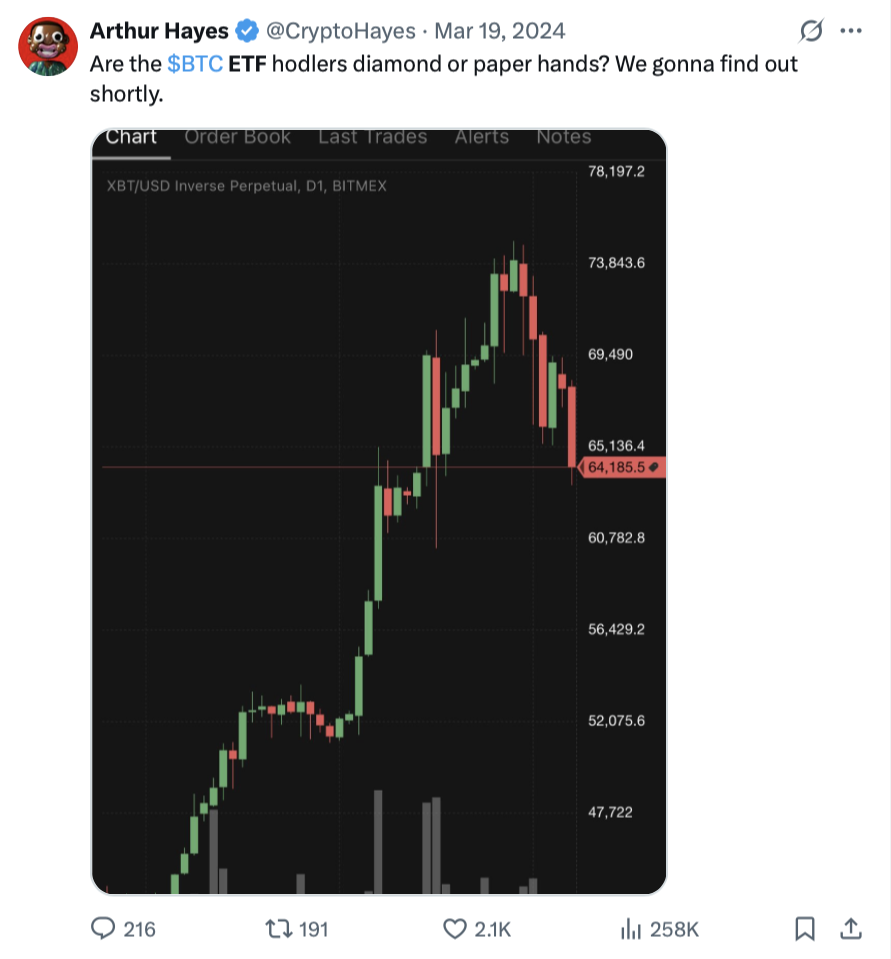BitMEX co-founder and Bitcoin billionaire Arthur Hayes is known for making big, bold — and sometimes controversial — Bitcoin price predictions, and says it doesn’t faze him when he gets it wrong.
“Nothing really happens,” Hayes tells Magazine, who asked if he worries about backlash when his Bitcoin predictions fall flat.
Win or lose, Hayes doesn’t sweat his calls
The youngest African-American crypto billionaire in history is the first to admit that most of his price calls don’t land. “I get it wrong, and I’ve gotten most of them wrong,” he laughs.
“I don’t know why people are hesitant to do it; it doesn’t really matter at the end of the day.”
“If you’re generally correct, you’re okay,” the 40-year-old former investment banker adds.
Hayes is pretty upfront with his calls; he doesn’t hide them if he’s right or wrong.
In September, Hayes — now the chief investment officer at the VC firm he co-founded, Maelstrom Fund — made a short-term bearish call on Bitcoin, linking it to the sliding Japanese yen. However, things didn’t unfold as he had expected over that particular weekend, and Bitcoin held strong.
Fair play to Hayes; he later owned it on X, posting, “I was wrong.”
“Time to trade some dogshit memecoins,” Hayes said. Similarly, on March 24, Hayes said that Bitcoin would hit $110,000 before it retests $76,500. But just a month later, on April 9, Bitcoin sank to $76,500.
Of course, credit where it’s due; Hayes gets it right too sometimes. In December, Hayes predicted a crypto downturn and a “vicious sell-off” after US President Donald Trump’s Jan. 20 inauguration…and he was spot on.
Probably because over the years, the New York-raised Bitcoin OG has developed a super-secret method to come up with his end-of-year price targets:
Pick round numbers that humans like.”
Hayes holding strong on $250,000 Bitcoin call for 2025
His latest call is that Bitcoin will reach $250,000 by the end of this year and is confident that Bitcoin won’t see another $70,000 drawdown on the way there.
“I really don’t see there’s going to be sort of a big binary risk-off at the moment that could spook the markets, and people will dump risks that would get us down to those levels again anytime soon,” Hayes says.
That said, Hayes isn’t on board with the super-bullish $1 million Bitcoin calls that some Bitcoiners, like Jan3 founder Samson Mow, think are possible by the end of the year.
“I think it’ll happen before the end of 2028; I don’t think it’ll happen this year,” Hayes says.

However, he’s not rushing to make any short-term predictions anytime soon. “I don’t know, we’ll see, it’s really dependent,” he says. “I usually try to make those if there’s a setup where everyone thinks one way and I think another way,” he says.
Unlike most of the wannabe trading geniuses on Crypto X, Hayes actually knows his stuff — he graduated from the University of Pennsylvania in 2008 with a BA in economics. Just six years later, in 2014, he was just 28 when he co-founded the crypto derivatives giant BitMEX alongside Ben Delo and Samuel Reed.
Hayes reflects on the home detention period of his life
In 2020, Hayes stepped down from BitMEX after the US Department of Justice charged him, along with Delo, Reed and Gregory Dwyer, for allegedly violating the Bank Secrecy Act.
Hayes and Delo pleaded guilty in February 2022, admitting they “willfully fail[ed] to establish, implement and maintain an Anti-Money Laundering program” at the exchange.
He ended up spending six months in home detention, confined to his house. It was a rough time, but Hayes also saw the positives.
“It sucked having to be one place you couldn’t leave and all that for six months, but I was in Miami; thankfully, it wasn’t a jail cell,” Hayes laughs.
In March, US President Donald Trump pardoned the four former BitMEX executives.

Despite the whole legal mess, Hayes remains one of the most respected Bitcoiners in the world. He’s treated like an A-list celebrity at crypto conferences, and even with his hit-or-miss track record, people still pay serious attention when he makes a price prediction.
Hayes now lives life on his own terms
Hayes can afford to make bold predictions because, unlike many crypto executives who stick to safe predictions, he’s already a multi-billionaire living life on his own terms.
And that was Hayes’ plan all along.
“I always got into this game trying to have control of my time,” he says. Hayes admits his life is pretty comfy at the moment. “I work out like two to three hours a day, read a lot of books, and then, you know, write here and there,” he says.
While Hayes does the heavy lifting in the gym, he says his team at Maelstrom Fund does most of the firm’s heavy lifting, “scouring the world for decent stuff to do.”
He admits he does work here and there for the fund, but he loves living the high life.
“I know I’m perfectly happy that I’m able to, you know, play tennis when I want to, go skiing, all that kind of stuff,” he says, adding:
“It’s not really about how many Bitcoins I have or how much, you know, cash in my bank account or in my wallet. It’s really, you know, can I go pay for my friends or go skiing for six months if I want to.”
Will the US government actually buy Bitcoin?
It was only fitting to ask Hayes what his numerical prediction was for the US government actually buying Bitcoin for its Strategic Bitcoin Reserve, which Trump signed off on in March.
“I’d say it’s a 1% chance,” he says.
“I’m still of the same opinion that they’re not going to sell the 200,000 Bitcoin that they seized, but I don’t see the US government printing money to buy Bitcoin,” he adds.
Even if other countries adopt a Bitcoin reserve, Hayes says 200,000 BTC is already worth “how many billions of dollars.”So, from the US perspective, it probably won’t trigger much FOMO compared to other nations.
“Everyone else, China probably has a similar amount, but they mined it. So I think more likely countries will mine Bitcoin rather than print money and then go take printed money and buy Bitcoin, assuming they’re a deficit nation,” he says.
“It’s a bit different if you actually generate income as a nation,” he says.
Surprisingly, Hayes has never been an advocate for the US Bitcoin Reserve. On May 1, Hayes said in an interview that he is “not really into the whole Strategic Reserve situation.”
At the time, he said it is hard to imagine any “properly elected” politician openly announcing that the government plans to print money to buy Bitcoin when the popular narrative is a bunch of Bitcoin bros going to the club.”
Bitcoin treasury companies will become “less important”
Hayes also shared his forecast on Bitcoin treasury companies, speculating that the newer firms will become more redundant.
“I think that they’re going to become less and less important as these trades get a bit more saturated,” Hayes says.
“Every subsequent one of these treasury companies, at least if it’s in a market that already has one, they don’t do so well, but it’s harder to generate a non-dilutive accumulation of Bitcoin,” Hayes explains.
He says most treasury companies will do a rights offering that decreases the ownership percentage per share, and then use the proceeds to buy Bitcoin, which is a “very dilutive strategy.”
“It’s hard to keep replicating that, especially in an almost saturated market like the US, maybe in other markets where they don’t have a MicoStrategy, then you’ll be able to do this a few times,” he says.
Bitcoin ETFs will trump Bitcoin treasury companies
Hayes is more bullish about spot Bitcoin exchange-traded funds; however, he doesn’t have a prediction of how much money will flow into the ETFs by the end of the year.
“I think it will continue to have inflows just because it’s the easiest way for anyone who’s got, like traditional fiat assets, to deploy into crypto,” Hayes says.
“They don’t have to worry about custody. It’s a one-for-one replicate.”

He predicts that since fund managers trust spot Bitcoin ETFs — and more regulators and banks are letting funds invest in them — they’ll “obviously suck capital” away from Bitcoin treasury companies.
“As a retail [investor], [they’ll be thinking] well, is that another sucker who’s going to pay a premium to do the simplest thing of buying Bitcoin,” he says.
What are the biggest unknowns for Bitcoin?
When asked if he sees any near-term risks to Bitcoin’s price, Hayes points to the possibility of a worldwide conflict erupting.
“Obviously, if there’s some sort of global war,” Hayes says. But if a full-scale world war broke out, he’s uncertain whether the price would rise or fall.
“Bitcoin could do really well or could do pretty poorly. Who knows what will happen in that situation?” Hayes says.
He brushes off the common fear among many Bitcoiners that quantum computing could break Bitcoin’s security.
“I think there’s so many people focused on that particular problem that I don’t think that’s going to be ultimately an issue for Bitcoin,” he says.


All Comments